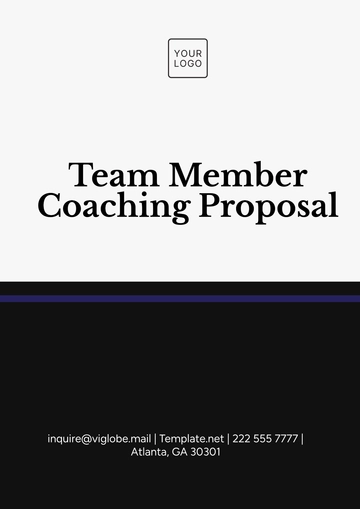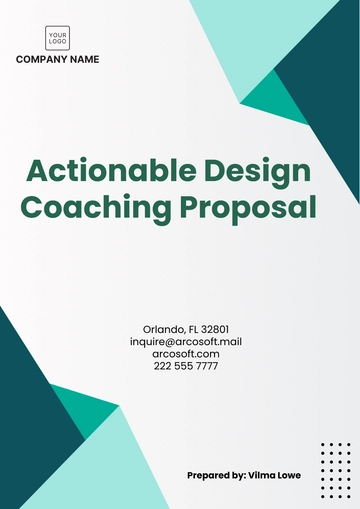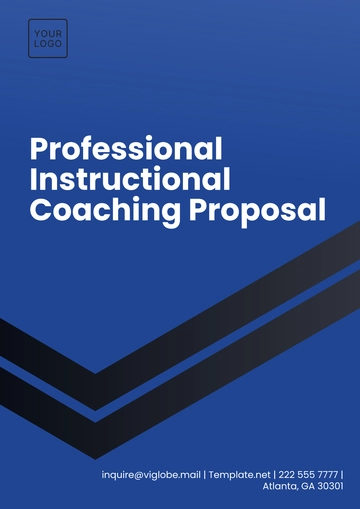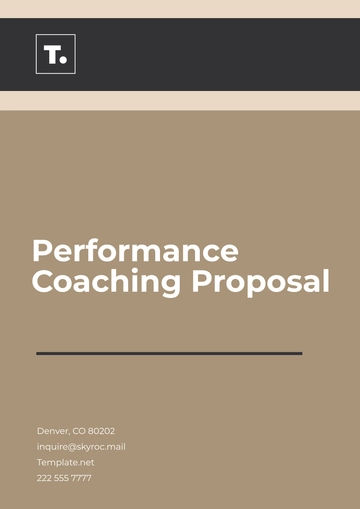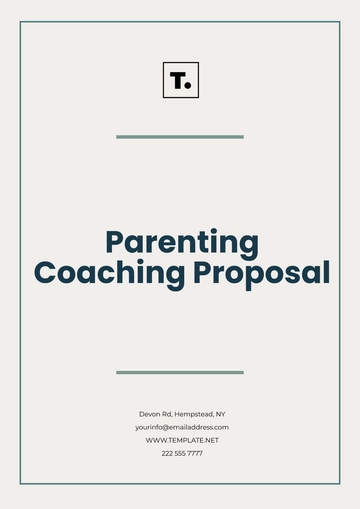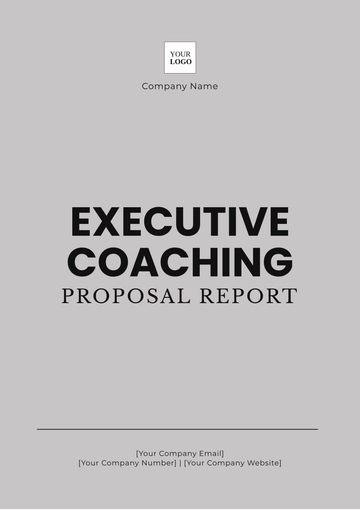Free Coaching Proposal

I. Introduction
In today’s fast-paced and highly competitive environment, the demand for personal and professional development is at an all-time high. Coaching has emerged as a powerful tool to help individuals and organizations unlock their full potential, sharpen their skills, and achieve both short- and long-term goals. This proposal outlines a coaching plan designed to facilitate personal growth, boost motivation, and empower participants to reach targeted milestones, all while enhancing overall performance.
1. Purpose and Scope
The primary goal of this coaching program is to equip participants with practical tools, strategies, and insights that will enable them to realize their maximum potential. This comprehensive program will address both personal and professional growth, ensuring that each participant experiences holistic development. The coaching experience is tailored to foster an environment of empowerment, self-reflection, and actionable improvement.
2. Benefits of Coaching
Engaging in a structured coaching program offers numerous advantages, including:
Enhanced Leadership Skills: Equip participants with the tools necessary for effective leadership in their roles.
Increased Self-Awareness & Emotional Intelligence: Strengthen personal understanding and emotional regulation, improving interpersonal interactions.
Improved Communication & Interpersonal Skills: Foster better relationships within teams, improving collaboration and productivity.
Heightened Problem-Solving Abilities: cultivate critical thinking skills to address challenges proactively and creatively.
II. Coaching Methodology
Our coaching methodology is designed to align with the specific goals, values, and aspirations of each participant. It is structured into several key stages to ensure sustained development, focus, and measurable outcomes.
1. Assessment Phase
The assessment phase is a foundational step in understanding the participant’s current position and potential growth areas. This phase includes both self-reflection and external feedback to ensure a holistic perspective on strengths, challenges, and areas of opportunity.
Activity | Description |
|---|---|
Self-Assessment Survey | Participants will complete a comprehensive survey to evaluate their current skills and future aspirations. |
360-Degree Feedback | Gathering feedback from peers, supervisors, and subordinates to provide a comprehensive view of the participant's capabilities and areas for growth. |
2. Development Planning
After gathering data from the assessment phase, a personalized development plan is crafted. This plan is designed to address specific learning needs, identify measurable goals, and outline strategies to achieve desired outcomes.
3. Coaching Sessions
Regular, interactive coaching sessions will take place throughout the program. These sessions focus on goal setting, developing core skills, overcoming challenges, and tracking progress. The coaching approach is collaborative, with the coach acting as both a guide and accountability partner.
III. Implementation Plan
The coaching program is designed to span six months, divided into manageable phases to ensure systematic progress and ongoing development. The plan is flexible, allowing for adjustments to suit the evolving needs of the participants.
1. Timeline and Milestones
Phase | Duration | Milestone |
|---|---|---|
Assessment & Feedback | Month 1 | Completion of initial assessments and feedback gathering |
Development Planning | Month 2 | Approval and finalization of personalized development plan |
Coaching Sessions | Month 3-5 | Mid-term progress review and skill development check-in |
Final Evaluation | Month 6 | Summative evaluation and feedback to measure success |
Regular reviews will be held throughout the process to evaluate progress and adjust goals where necessary, ensuring the program stays relevant and impactful.
IV. Evaluating Success
1. Metrics and Outcomes
The success of the coaching program will be measured through a combination of quantitative and qualitative metrics, including:
Completion Rate of Development Objectives: Tracking the achievement of specific goals outlined in the development plan.
Feedback from Participants & Supervisors: Gathering both subjective and objective evaluations from participants and those working closely with them.
Application of Skills in Real-World Scenarios: Evaluating the participant’s ability to implement and leverage new skills in their professional environment.
2. Feedback Mechanisms
Continuous feedback will be gathered through periodic surveys, interviews, and one-on-one discussions. This will ensure that the coaching process remains relevant and effective, allowing for real-time adjustments to the program to maximize its impact.
V. Conclusion
This coaching proposal offers a highly structured and customized approach to personal and professional development. By committing to this coaching program, individuals and organizations can expect significant improvements in performance, self-awareness, and job satisfaction. With a clear roadmap for success, participants will be well-positioned for continued growth and achievement in their careers.
- 100% Customizable, free editor
- Access 1 Million+ Templates, photo’s & graphics
- Download or share as a template
- Click and replace photos, graphics, text, backgrounds
- Resize, crop, AI write & more
- Access advanced editor
Elevate your coaching business with this Coaching Proposal Template offered by Template.net. This fully customizable, downloadable, and printable template is designed to create compelling proposals that align with your coaching services. Save time with a professional format that’s also editable in our AI Editor Tool, ensuring an easy, tailored experience that meets your unique needs.
You may also like
- Business Proposal
- Research Proposal
- Proposal Request
- Project Proposal
- Grant Proposal
- Photography Proposal
- Job Proposal
- Budget Proposal
- Marketing Proposal
- Branding Proposal
- Advertising Proposal
- Sales Proposal
- Startup Proposal
- Event Proposal
- Creative Proposal
- Restaurant Proposal
- Blank Proposal
- One Page Proposal
- Proposal Report
- IT Proposal
- Non Profit Proposal
- Training Proposal
- Construction Proposal
- School Proposal
- Cleaning Proposal
- Contract Proposal
- HR Proposal
- Travel Agency Proposal
- Small Business Proposal
- Investment Proposal
- Bid Proposal
- Retail Business Proposal
- Sponsorship Proposal
- Academic Proposal
- Partnership Proposal
- Work Proposal
- Agency Proposal
- University Proposal
- Accounting Proposal
- Real Estate Proposal
- Hotel Proposal
- Product Proposal
- Advertising Agency Proposal
- Development Proposal
- Loan Proposal
- Website Proposal
- Nursing Home Proposal
- Financial Proposal
- Salon Proposal
- Freelancer Proposal
- Funding Proposal
- Work from Home Proposal
- Company Proposal
- Consulting Proposal
- Educational Proposal
- Construction Bid Proposal
- Interior Design Proposal
- New Product Proposal
- Sports Proposal
- Corporate Proposal
- Food Proposal
- Property Proposal
- Maintenance Proposal
- Purchase Proposal
- Rental Proposal
- Recruitment Proposal
- Social Media Proposal
- Travel Proposal
- Trip Proposal
- Software Proposal
- Conference Proposal
- Graphic Design Proposal
- Law Firm Proposal
- Medical Proposal
- Music Proposal
- Pricing Proposal
- SEO Proposal
- Strategy Proposal
- Technical Proposal
- Coaching Proposal
- Ecommerce Proposal
- Fundraising Proposal
- Landscaping Proposal
- Charity Proposal
- Contractor Proposal
- Exhibition Proposal
- Art Proposal
- Mobile Proposal
- Equipment Proposal
- Student Proposal
- Engineering Proposal
- Business Proposal




